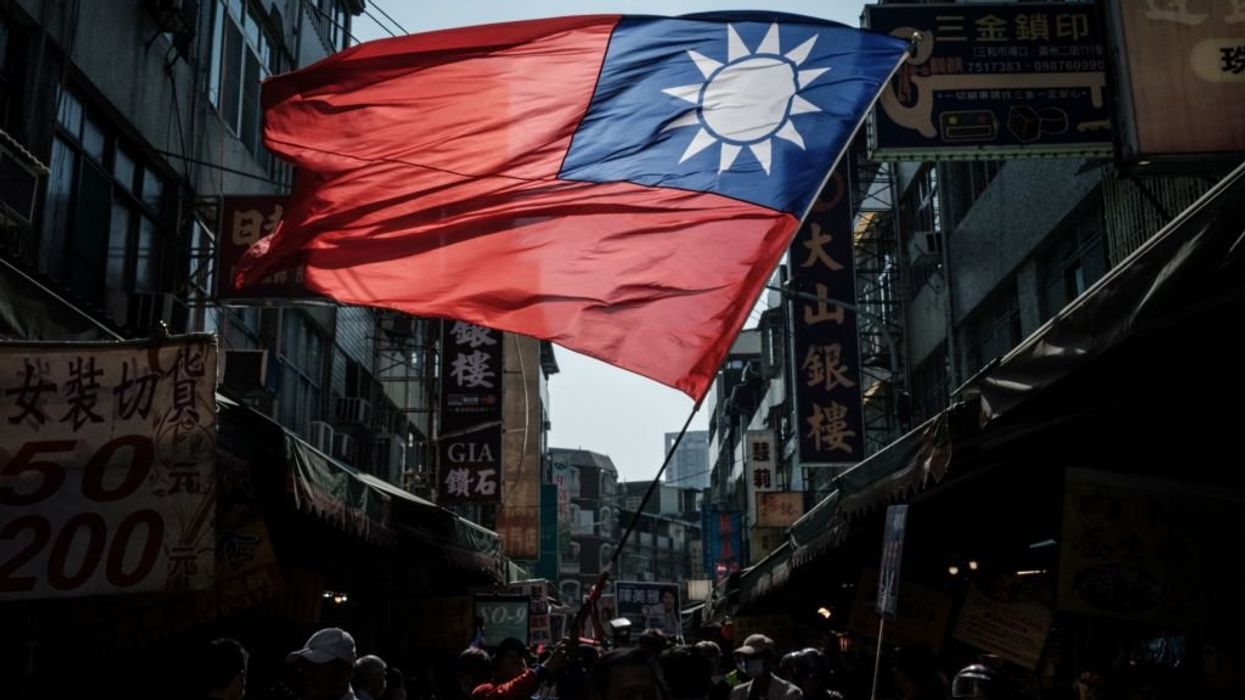
Photo by YASUYOSHI CHIBA/AFP via Getty Images

American and Chinese military officials met this week to discuss Taiwan's fate days ahead of the sovereign island nation's presidential election, which Chinese dictator Xi Jinping characterized as a choice between war and peace.
Presidential candidate William Lai Ching-te of the Democratic Progressive Party was leading in the polls with 36% as of Jan. 3.
According to the Economist, a win for Lai — the former mayor of the southern city of Tainan, deemed a "complete troublemaker" by the communist Chinese regime — would likely prompt China to issue more threats and take additional steps to isolate Taiwan.
Lai has served as outgoing President Tsai Ing-wen's vice president. Tsai ruffled Chinese feathers during her tenure, having refused to appease the communists by publicly claiming Taiwan belonged to Beijing.
Lai, whom China refuses to speak with, appears keen to continue asserting Taiwan's independence from the mainland. He has stressed the island nation's right to self-rule, underscoring in a December debate that the communist regime poses a "threat to Taiwan and the international community."
Despite his independent mindset, the Economist indicated Lai's victory is far from assured as his party has an optics problem with young voters, who regard the DPP as establishmentarian.
Lai's top opponent with 31% is Hou You-yi, the leader of the conservative Kuomingtang. Hou is a former cop and mayor of New Taipei City who has reportedly rejected the notion of the sovereign island nation's independence from China as well as the "one country, two systems" model favored by Beijing.
Ko Wen-je of the Taiwan People's Party has been trailing third in the polls with 24% of the likely vote. Ko, a former surgeon, served as mayor of Taipei, the nation's capital, until 2022, then went on to found the TPP. Supportive of a possible coalition with the KMT, Ko appears keen on not rocking the boat in regard to China. He did, however, stress during the presidential debate that "Taiwan needs self-reliance."
Chinese dictator Xi Jinping threatened once again in his New Year's address that China would "surely be reunified, and all Chinese on both sides of the Taiwan Strait should be bound by a common sense of purpose," reported the Associated Press.
Xi further suggested the Taiwanese presidential election amounted to a choice between war and peace.
Clarifying the regime's bias, Chen Binhua, a spokesman for China's Taiwan Affairs Office, called Lai a "destroyer of peace" and accused him of being an "instigator of a potential dangerous war in the Taiwan Strait."
U.S. Sen. Dan Sullivan (R-Alaska), who is leading a bipartisan Senate resolution this week praising democracy in Taiwan and supporting its self-defense, told Fox News over the weekend that Taiwan's eighth presidential election constitutes "a huge vulnerability to the premise of Xi Jinping's dictatorship."
"Xi Jinping fears his own people and he fears that people on the mainland are going to look across the Taiwan Strait and go, 'Wait a minute, how come we can't do that?'" said Sullivan. "Every one of these parties, even the KMT, they're all starting to move away from any kind of accommodation policy towards Beijing. Almost two-thirds of Taiwanese in recent polling now see themselves exclusively as Taiwanese. These are all things that I think Xi Jinping realizes. He's quite vulnerable."
U.S. and Chinese military officials met in Washington this week. While the talks were supposedly administrative in nature, policy concerns were nevertheless raised.
According to the Pentagon, Michael S. Chase, deputy assistant secretary of defense for China, Taiwan, and Mongolia, "highlighted the importance of maintaining open lines of military-to-military communication in order to prevent competition from veering into conflict."
Chase further "reaffirmed that the United States will continue to fly, sail, and operate safely and responsibly wherever international law allows," referencing the Taiwan Strait.
The Chinese delegation said, "China will not make any concession or compromise on the Taiwan question and demanded that the US side abide by the one-China principle, honor relevant commitments, stop arming Taiwan, and not support Taiwan independence," according to China's ministry of defense.
The U.S. does not have a formal defense treaty with Taiwan, but nevertheless provides it military gear under the
Taiwan Relations Act, which authorizes America to "make available to Taiwan such defense articles and defense services in such quantity as may be necessary to enable Taiwan to maintain a sufficient self-defense capability" and to "maintain the capacity of the United States to resist any resort to force or other forms of coercion that would jeopardize the security, or the social or economic system, of the people on Taiwan."
The Chinese delegation, led by Major General Song Yanchao, further demanded that the U.S. "reduce military presence and provocation in the South China Sea and stop supporting provocative actions by certain country."
Like Blaze News? Bypass the censors, sign up for our newsletters, and get stories like this direct to your inbox. Sign up here!